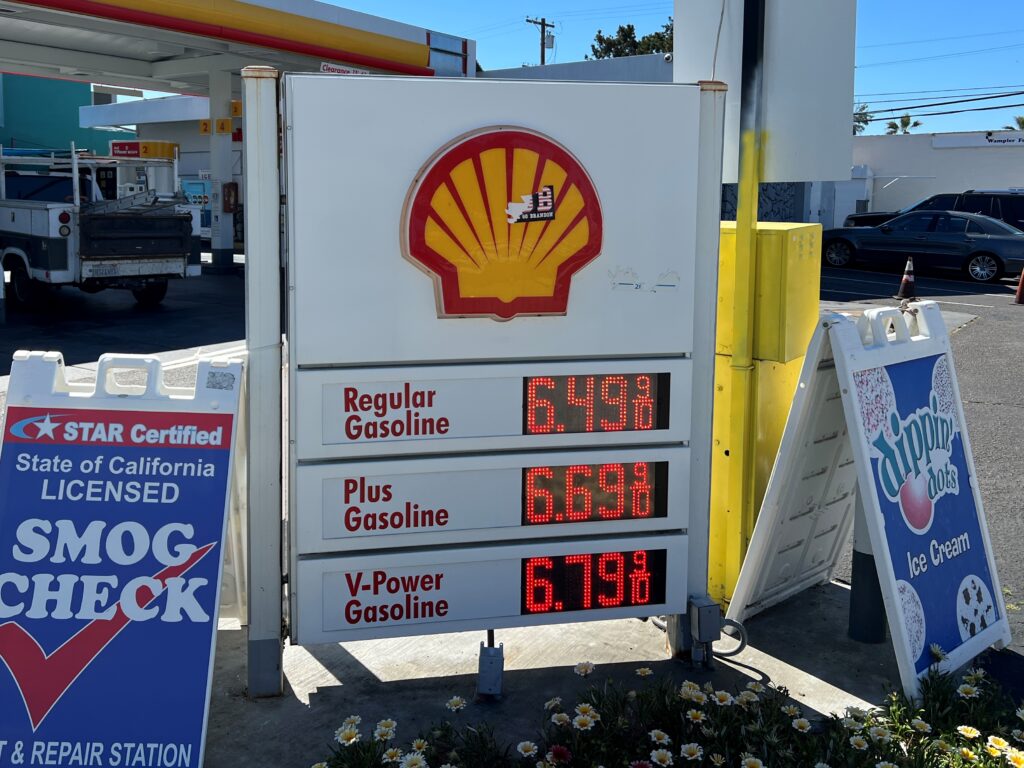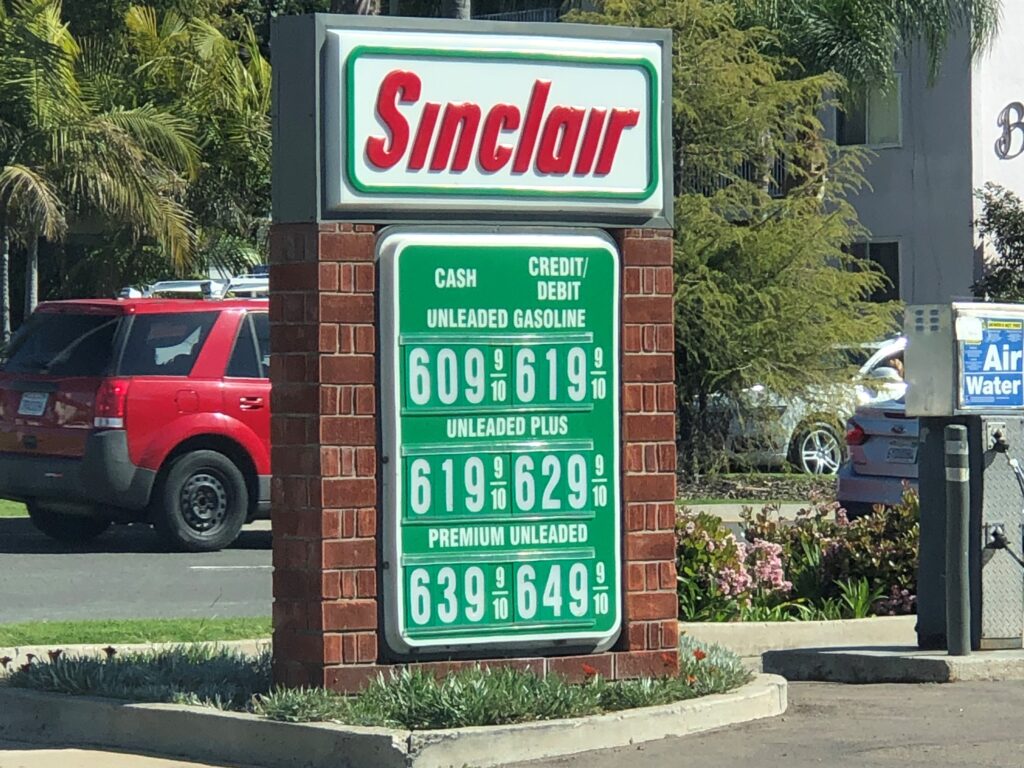Originally published on CalMatters.org, a nonprofit, nonpartisan media venture explaining California policies and politics.
![]()

California is flush with cash — the state has an estimated budget surplus of $21 billion — and, separately, gas prices are way up.
Those two facts combined have lawmakers tripping over themselves with spending proposals to help people with rising costs.
Last week, a cohort of Assemblymembers proposed giving every California taxpayer $400 to offset new, higher prices for goods and especially gas. A few days later, the Los Angeles Times reported details of another proposal, this one from Democratic leaders in the Legislature: $200 to each taxpayer, plus $200 for each kid for families making up to $250,000, and a grant program with the same benefits for people who don’t file income taxes.
On Wednesday, Gov. Gavin Newsom threw yet another idea into the mix which, among other things, would give car and truck owners $400 per vehicle via debit cards, for up to two vehicles per person. The governor’s proposal does not have an income cap “in order to include all Californians who are facing higher prices due to the cost of oil,” the administration said in a statement.
The plans to send cash to Californians directly come on the heels of Republican calls to temporarily suspend the state’s gas tax of roughly 51 cents per gallon in its entirety and a proposal from the governor in January to pause a planned 3-cent increase in the state gas tax. Both approaches to reducing the gas tax predate the war in Ukraine, which has driven gas prices even higher.
Lawmakers want to do something in response to the higher gas prices. What remains to be negotiated is who gets how much, and how exactly they get it.
A check that people can spend however they want, particularly if it’s targeted at lower- and moderate-income Californians, makes sense, said Chris Hoene, executive director of the left-leaning California Budget and Policy Center, which advocates for aid aimed at lower-income Californians. Rising gas prices wind up making lots of products more expensive, he points out, and lower-income people feel the effects of increased gas prices much more acutely.

On average, Californians spend about 4% of their income on gas for their cars and homes, according to research from the Public Policy Institute of California. But Californians in the bottom fifth of earners spent about 16% of their income on gas. In other words, when gas prices go up, people who make less money feel the squeeze on their budgets for food, housing and other essentials.
Families who don’t have a lot of flexibility in their household budget feel these price increases the most, said Sarah Bohn, an economist at the Institute.
Giving more money to people with more cars rather than distributing money to lower-income people doesn’t make sense, said Hoene. “I think it’s terrible,” he said of the governor’s proposal. “Millionaires and billionaires who don’t need the credit at all will be receiving it because they happen to have a record at the DMV.”
He also cautioned that sending checks to people with more money in the bank might exacerbate inflation. While lower-income households would likely use the money to meet their basic needs, higher income households that didn’t have to cut back in response to increasing gas prices might use a check as a chance to splurge and order things off their Amazon wishlists. But he complimented another part of Newsom’s proposal, which would theoretically make public transit free for three months, because it would make it easier for people to use transit options that use less fossil fuels.
Sending money directly has proven to be an effective tool for helping people when economic circumstances change, most recently during the pandemic. The stimulus checks the federal government sent out kept 11.7 million Americans from falling into poverty during the pandemic, the Census Bureau found.
Sending out checks and cutting the gas tax both have the same aim, but the two methods have different implications for reducing usage of fossil fuels, says David Neumark, an economist at UC Irvine.
When the price of gas is high, people try to use less of it, said Neumark. If the state sends out checks, people who can’t change how much gas they use can use the money to offset higher prices at the pump, while others could try to drive less and use the money to cover other needs.
“We want the price of gas to be high to discourage people from using gas,” said Neumark. Cutting the gas tax to directly bring down the price of gas, he said, would have the opposite effect: It would make it easier for people to decide to drive more.
“A lot of people don’t have the luxury of just being able to say ‘oh gosh, I guess I’ll stop driving.’” said Assemblymember Kevin Kiley, a Republican from Granite Bay who introduced a bill that would get rid of the state gas tax for six months.
“If you have to drive a long way to work or you live in a rural area and there is no access to public transit; If you’re someone who is a low income person can’t necessarily afford to go out and buy a Tesla tomorrow,” said Kiley, “there really is no viable alternative in a lot of these situations.”
One benefit of cutting the gas tax temporarily is that it’s simple and fast, said Kiley. He critiqued the complexity of Newsom’s proposal, saying it “seems like it involves a lot of bureaucracy and seems like it preserves the role of the government in directing where funds go and who gets them.”
One drawback of cutting the state gas tax is that it’s not clear exactly how much it would drive down prices. The gas tax is paid by suppliers, so they would need to pass the savings along in order for the price to come down. With the global oil market constrained by sanctions, it’s not clear how much of the tax cut consumers would see at the pump.
The current spike in gas prices has been driven by Russia’s invasion of Ukraine and the sanctions that followed. That situation doesn’t necessarily warrant a broad-based solution from California lawmakers, said Neumark. Giving checks to everyone might score political points, he said, but middle- and higher-income Californians can handle higher gas costs.
“Bad stuff is happening out in the world and someone’s got to help pay for it,” said Neumark. “Other people are paying with their lives, right? We’re paying a dollar more for gas.”
Written By GRACE GEDYE

Grace covers California’s economy for CalMatters. Previously, she was an editor at the Washington Monthly. She is a graduate of Pomona College. More by Grace Gedye




